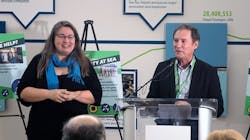Sea-Tac Airport Expands Services to Make Travel More Accessible
Seattle-Tacoma International Airport (SEA) announced new services this week to make travel more accessible and less stressful for everyone. The expanded services, like a new pilot program to meet the needs of guests with hidden disabilities, make the airport more accessible and help improve the travel experience beyond the Americans with Disabilities Act (ADA) requirements.
“We are working to make Sea-Tac Airport the most accessible airport in the nation. We are making strides to help our passengers safely navigate a loud and crowded airport by improving signage and increasing options for travel to and from the airport,” said Port of Seattle Commissioner Peter Steinbrueck. “All travelers should feel welcomed and that the airport meets their needs. New initiatives like the sunflower lanyards and improved design make travel more accessible and less stressful for everyone.”
The improvements advance the airport’s objective to make travel as easy, safe, and comfortable as possible.
“There is something very special about what is happening in Seattle,” said Open Doors Organization Executive Director Eric Lipp. “The Port of Seattle is raising the bar, not only for itself, but for airports in the U.S. and across the globe. From new curb cuts to sunflower lanyards that help people with hidden disabilities, Sea-Tac Airport is a leader and is to be applauded for holding itself to a higher standard by weaving access into its identity.”
“It is thrilling that Sea-Tac Airport is improving its services for people with hearing loss,” said Cheri Perazzoli, Director of Advocacy, Hearing Loss Association of America – Washington State (HLAA-WA) and Founder/Director of Let’s Loop Seattle. “Traveling with a hearing loss can be stressful, disorienting, and even unsafe at times. Airports often have poor acoustics and lots of competing noises. HLAA-WA applauds the pioneering efforts of SEA to aid travelers with invisible disabilities such as hearing loss through its hearing loop and sunflower lanyard programs.”
